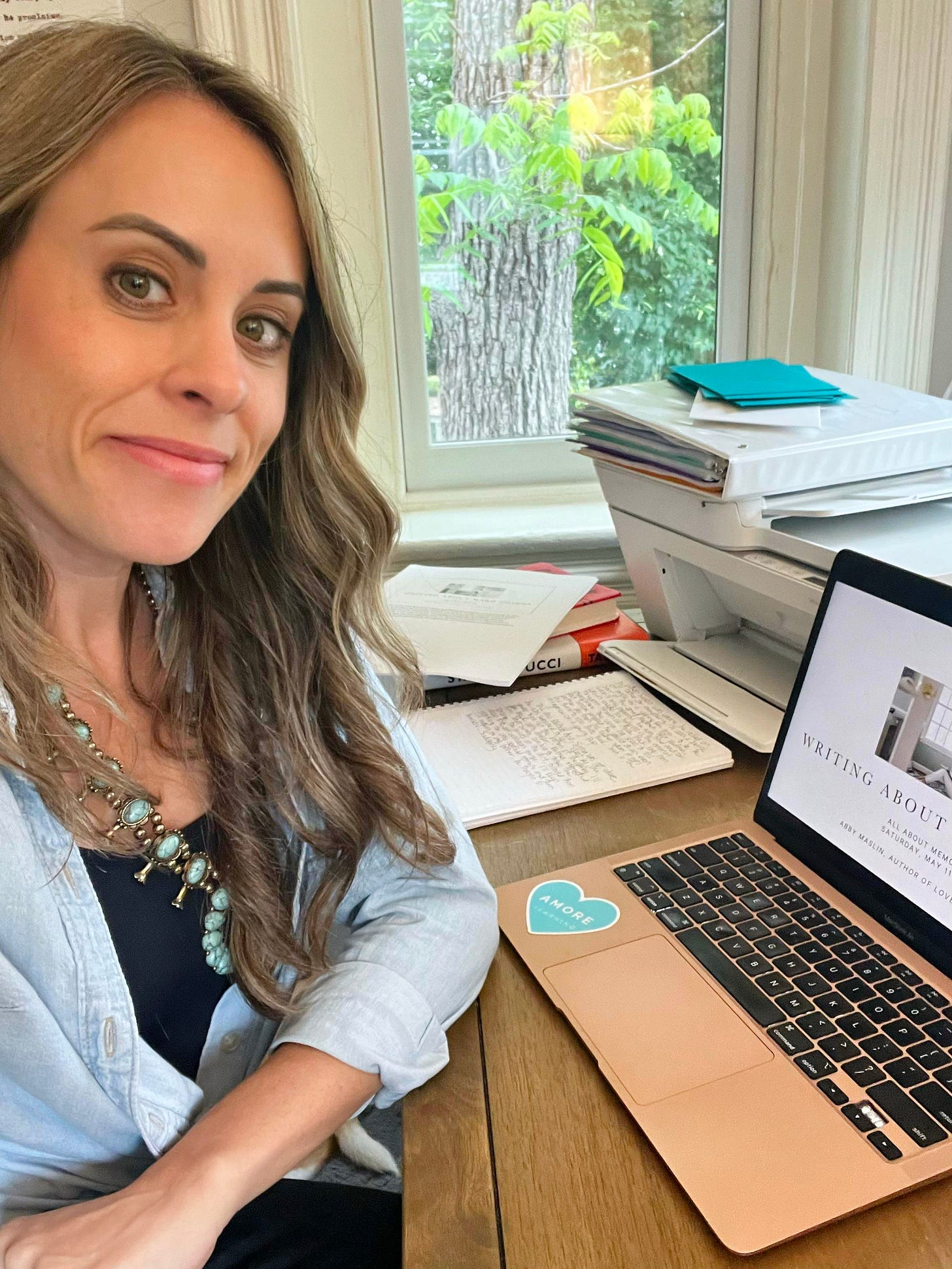Writing about Hard Things
Tackling trauma on the page and why I'm not planning on another memoir anytime soon
Writing about Hard Things was the title of the panel I led last weekend for an all-day memoir writing workshop compiled by
. It’s always a great pleasure to talk about memoir, not only because it’s my first and most beloved genre, but because the choices a memoirist makes are utterly distinct from those of a novelist. It’s a genre that truly stands alone.With that said, I’m in no hurry to publish another one. More on that in a moment.
One of the focuses of my panel was the responsibility of the memoirist. When readers dive into a memoir, they make quick judgments about the reliability of the storyteller. Is this a trustworthy person? Are they self-aware? Have they done the reflection necessary to mine their story for its universal significance?
On the surface, it’s a genre that can appear self-obsessed, but a gifted memoirist is anything but selfish. Their objective is to create something with intrinsic value to others. Whether imparting a particular wisdom or offering a unique viewpoint, memoir should strive to deliver something new.
I don’t know any memoirist who approaches this task flippantly. While plenty of people write as a way of understanding the world around them, a memoirist with goals of publication is compelled by a force that transcends reason. Who on earth would willingly agree to such painful and public self-excavation?
Me, I guess. That’s who.
For me, the desire to publish a memoir stemmed from my wish to bring forth the book I needed during my own journey as a caregiver - something that would resonate with those whose worlds had been swept out from under them and offer the empowering reminder that the brain is capable of reinvention, inviting us all to become something new.
But let me be clear: Not everyone in my life agreed with my decision to write it. They couldn’t imagine exposing themselves in the way I had volunteered for and, perhaps, couldn’t understand the value. To their credit, there are plenty of reasons not to write something as personal as a memoir. And navigating the tough stuff is at the top of that list.
In preparation for last weekend’s panel, I stood before my bookshelf and examined dozens of memoirs. I couldn’t find a single one that didn’t deal with some level of trauma or difficulty1. Even the books that didn’t tackle death, grief, illness, violence, or some other explicit trauma still possessed undertones of hard stuff (i.e. navigating challenging parental relationships, not fitting in, life transitions, etc.). That’s because life is hard! Figuring out how to write about it is the key to making memoir work.
Why You Shouldn’t Rush It
A year into my relationship with my agent, I phoned her to share that my life was falling apart and I might not have a book in me after all. I remain forever grateful for what she advised. She said, “Abby, go live your life. Go heal your marriage. Come back to me when you’re ready to tell this story.” So I did.
It took four years of rebuilding my life before I was ready to sit down and begin the process of honest excavation that resulted in LOVE YOU HARD. All in all, it was a six-year effort. And I’m so glad I didn’t rush it.
When I look back at early drafts, my blindspots are painfully visible. I did not yet have the insight to know how the experience had changed me. What I had was plot: a series of events (mostly compounding traumas) with weak interiority. But memoir is more than a Trauma Olympics. It’s not about sharing every gory detail on the page. It’s about weaving the hard moments into a thoughtful narrative that speaks to the human experience.
The most important advice I can offer any aspiring memoirist is not to rush the process. After all, you cannot understand why your story will matter to others until you understand what it has meant to you.
Operating with Honesty & Compassion
Regardless of how many people read your words, a book is forever and, as an author, you want to be able to stand by your creation. Throughout the process, I did my best to keep honesty and compassion at the forefront of my decision-making and I’m as proud of the moments I excluded from my memoir as I am of those I wrote about. Although there were plenty of details I could have included because they’d be juicy to a reader, they did not serve my sense of integrity, the people in my life, or the narrative arc of the story. So I left them out.
Memoirists must be compassionately selective in what they choose to include, remembering that our subjects are real and that few choose to become the characters in someone’s else book. Does that mean we can’t write about anyone but ourselves? NO! But we must make careful decisions about who the camera is pointing toward in a story, something we can determine by asking, What kind of story is this? Because I was focused on telling a story about a relationship, I chose not to let the camera linger on the violent assault that begins that story, nor the people responsible for it, even though I understood those elements to contain great curiosity for others.
From the get-go, I was also very intentional about not trying to tell my husband’s story. His perspective is fascinating and would make its own wonderful book, but that story doesn’t belong to me. As a memoirist, our responsibility is to show the world only through our eyes, making sure to apply the same critical lens to our own choices and actions as we do to others.
This work involves a tremendous amount of self-compassion. Contrary to what some may imagine, it doesn’t necessarily feel therapeutic or cathartic to dredge up our most painful moments and lay them bare on the page. Ironically, I found I was only ready to do this work once I’d fully crossed over into a calmer, more stable chapter of life. I drafted much of LOVE YOU HARD with a precious new baby in one arm, forcing my brain to travel back to the days before I could imagine that child’s existence. Sometimes it took hours to get to that place where I could feel it all again: the shock, the uncertainty, the utter loneliness. And then, when my writing time was over, I’d have to carve a mental path back to the present moment. The dropping in and out was tough, and I learned that I couldn’t force it.
It’s OK if the moment is not right to write about it. It’s OK if you need more time to heal. Compassion is a non-negotiable when it comes to the art of memoir writing.
Why I’m Done with Memoir (for now)
After she released UNTAMED, I remember Glennon Doyle’s response to someone who asked when her next memoir might be coming. She said, “I never write a new book until I’ve become a new woman.”
This made perfect sense.
I could only write LOVE YOU HARD because it depicted a chapter of life that was no longer my present reality. Sometimes I think of the experience as writing myself into a new chapter. And the happy news is that my new chapter is pretty boring.
That’s not to say there’s nothing new to write about. Maybe one day I’ll be interested in reflecting on the ways brain injury continues to show up in life and in marriage, or maybe I’ll have a whole new story to tell. But right now is a moment for privacy, not a moment for sharing. I’m focused instead on being present for the simple gifts I once prayed for: walking my kids to school, Friday movie nights, soccer practice, school plays.
One day I’ll wake up and find that I’m a different woman living a different chapter, and maybe the moment will be right for sharing my story with others. For now, my life is just for me.
Truthtellers I Adore
Kelly McMasters and THE LEAVING SEASON: Kelly’s achingly gorgeous memoir is written as a series of essays and each one is spellbindingly potent. It’s a memoir worth studying for its structure, but also for the way she treats her subjects: critically, wholly, and with generous observance. I loved hearing Kelly discuss her process on The Shit No One Tells You About Writing.
Reema Zaman and I AM YOURS: If I’m likely to write another memoir anytime soon, it will be about how I fell in love with Reema Zaman from her writing alone. It’s hard to believe it’s been five years since I sunk my face into the magical poetry that is I AM YOURS. A story about a woman learning to reclaim her voice, Reema’s words possess such tender vulnerability that I consider this book a bible in honesty.


Suleika Jaouad and BETWEEN TWO KINGDOMS: Few are more qualified to speak on the topic of writing about hard things than Sukeika. At this point, she likely needs no introduction (whether you’re familiar with her work or not, check out this recent profile in The Atlantic by word maven, Jen Senior). And then read Suleika’s memoir, BETWEEN TWO KINGDOMS, which is no cancer memoir you’ve read before, but a swell of compassion for all humans.
Throwing out a challenge here: can you name a memoir that doesn’t tackle something hard?








Beautifully written Abby, as always. Another well-written, albeit heart wrenching, memoir is "When Breath Becomes Air" by Paul Kalanithi. I would like to reread it because it has been years since I first read it, but I am resistant. I wept (ugly cried) the first time.
And let's not forget Charity Tillemann-Dick's memoir, "The Encore." Miss her so much.
I loved the energy you brought to your presentation in Bianca’s memoir workshop! And there’s so many wonderful takeaways in this piece, too. I began writing my memoir at age 57, decades after the events took place. I definitely needed the time, distance, and perspective to write an honest and relatable story.